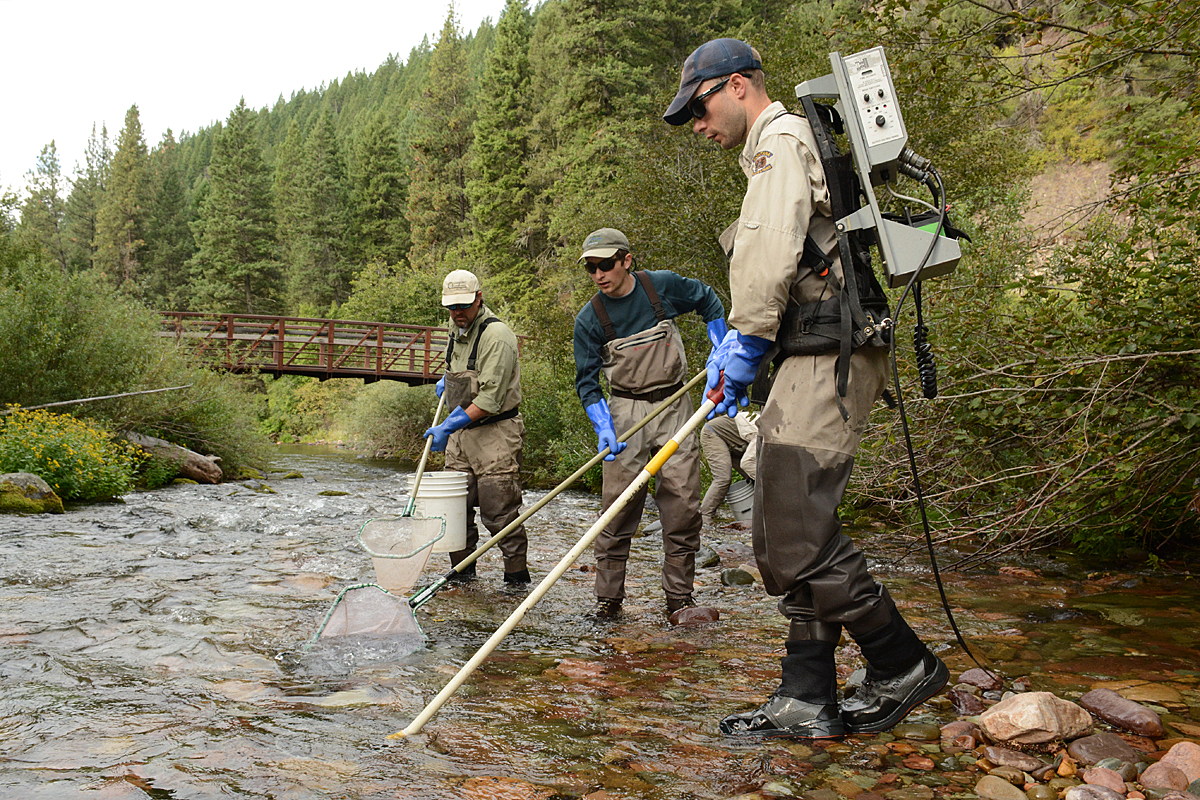
 The Fish, Wildlife & Parks commission learned a little more about why it must now review fish restoration projects, although the department’s justification for the new procedure appears shaky.
The Fish, Wildlife & Parks commission learned a little more about why it must now review fish restoration projects, although the department’s justification for the new procedure appears shaky.
FWP headquarters staff this week held a work session to explain why FWP commissioners will henceforth be reviewing all fish restoration projects that include fish removal.
At the upcoming commission meeting on June 24, that will include 14 projects planned for this summer that were put on hold earlier this month. Eight projects were allowed to go ahead, because they’ve already received commission approval as part of the FWP Future Fisheries program.
FWP attorney Rebecca Dockter said FWP Director Hank Worsech asked her to research whether the commission needed to approve fish restoration projects. In the past, such projects have gone through public comment periods as part of the Montana Environmental Policy Act procedure but haven’t required commission approval unless they were being considered for Future Fisheries grants.
Dockter said her interpretation that commission approval was required was based on the removal of fish, not the restocking, which is clearly defined in statute.
“The focus today will mostly be on the first one, the removal,” Dockter said. “When we hear controversy from the public, it’s usually removal of a species from a stream, river or lake that causes that controversy.”
Dockter went through a few laws that touch on fish removal but said two statutes were the grounds on which she based her decision.
One statute deals with the extermination of transplanted or introduced wildlife. Dockter said it could also apply to fish, such as rainbow or brook trout that are not native to Montana. The statute says the commission must determine that the species poses harm to native wildlife.
Another statute broadly defines the policies of the commission, including setting “the policies for the protection, preservation, management, and propagation” of fish and wildlife.
“That authority is very broad, and you can interpret under that the authority for the commission to set the policy to remove fish from a stream for the protection of native or sport fisheries that you would then introduce into the waterbody. That’s the place where I think the commission has the authority to approve specific fish removal project and under which the commission will hear 14 fish projects,” Dockter said.
Commissioner Pat Byorth, who is also an attorney, questioned Dockter’s interpretation, especially because nothing in the latter statute specifically requires the commission to review individual projects.
Dockter said the Legislature has given the department the authority to do fish restoration and stocking but hasn’t given any specific authority for fish removal.
“So when I look at the specific question of fish removal, I don’t see specific authority. I see it under a general authority that includes commission authorization,” Dockter said. “I see it as an interpretation argument. And I do think that my opinion is it’s pretty clear we should go to the commission.”
Byorth said he didn’t mind the commission reviewing projects. But he questioned why the department would hold up 14 projects that were already publicly vetted based upon a debatable interpretation of the law.
Some of the projects are already partway through the restoration work and involve several other partners. In other instances, existing projects would be grandfathered, and the new policy would apply to future projects.
“To stall out these projects – that are very expensive, involve extensive planning, an investment of not only department dollars but an investment of outfitters, business people, landowners, all kinds of agencies all getting together, building this collaborative process and then have them interrupted right at the key moment – does not seem to be grounded in policy or statute. It seems to be political,” Byorth said. “I’m not going to dispute Becky’s legal interpretation. What I am disputing is the political motivation behind this for existing projects.”
Worsech bristled, saying his intent was to make everything more transparent. He said the catalyst for the change was Senate Bill 360, which originally would have required the commission to offer more fishing opportunities if restoration projects reduced the opportunity to catch fish.
The bill was amended to remove that, but Worsech said he decided to look into it.
“I don’t think there’s anything politically motivated, and I actually take personal offense to that, sir,” Worsech said. “From my perspective, I don’t think this would have been an issue if there would have been the same commission as we had before. Now, there’s a change in commission, there’s a question from different groups that are concerned about what’s going to happen. This is nothing more than being very, very in front of it.”
Fisheries biologists then explained the general details of fish removal, including the facts that removal doesn’t always involve killing fish and restoring native fisheries almost always results in better fishing opportunities.
Fisheries administrator Eileen Ryce said the new process would complicate things so staff asked that they be allowed to ask the commission for initial endorsement to proceed prior to carrying out the public process. Then once the project is finalized, they would ask the commission for final approval. She also asked if they could batch as many projects as possible to streamline the approval process.
Contact reporter Laura Lundquist at lundquist@missoulacurrent.com.
May 19, 2021 at 09:39PM
https://ift.tt/2QuVcqE
Attorney argues for FWP commission review of fish restoration removal - Missoula Current
https://ift.tt/35JkYuc
Fish



No comments:
Post a Comment